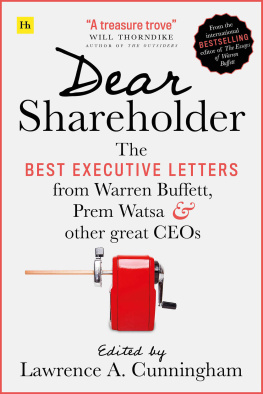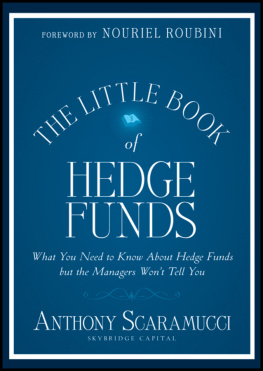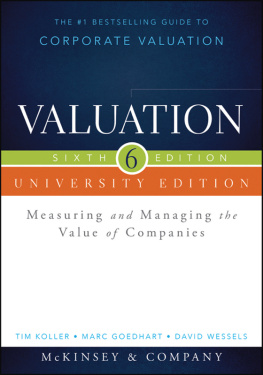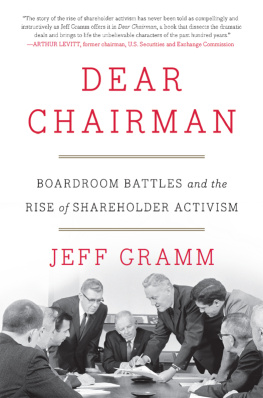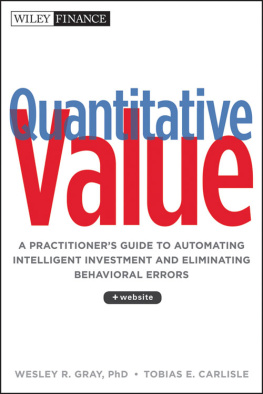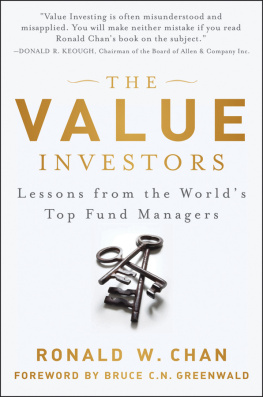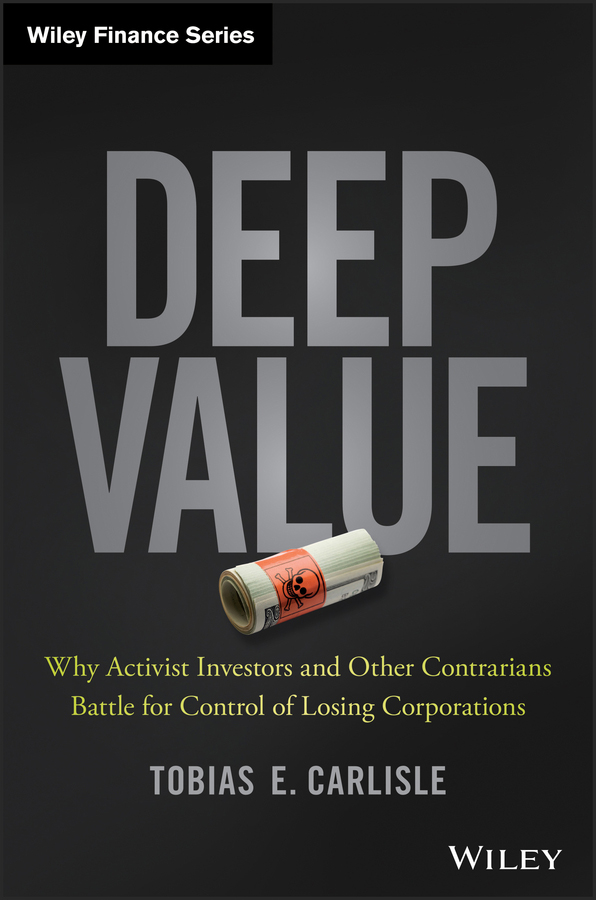
Contents
List of Illustrations
List of Tables
Pages
Guide
The Wiley Finance series contains books written specifically for finance and investment professionals as well as sophisticated individual investors and their financial advisors. Book topics range from portfolio management to e-commerce, risk management, financial engineering, valuation and financial instrument analysis, as well as much more. For a list of available titles, visit our website at www.WileyFinance.com.
Founded in 1807, John Wiley & Sons is the oldest independent publishing company in the United States. With offices in North America, Europe, Australia, and Asia, Wiley is globally committed to developing and marketing print and electronic products and services for our customers professional and personal knowledge and understanding.
Deep Value
Why Activist Investors and Other Contrarians Battle For Control of Losing Corporations
TOBIAS E. CARLISLE
Cover image: iStock.com/davidhills
Cover design: Wiley
Copyright 2014 by Tobias E. Carlisle. All rights reserved.
Published by John Wiley & Sons, Inc., Hoboken, New Jersey.
Published simultaneously in Canada.
No part of this publication may be reproduced, stored in a retrieval system, or transmitted in any form or by any means, electronic, mechanical, photocopying, recording, scanning, or otherwise, except as permitted under Section 107 or 108 of the 1976 United States Copyright Act, without either the prior written permission of the Publisher, or authorization through payment of the appropriate per-copy fee to the Copyright Clearance Center, Inc., 222 Rosewood Drive, Danvers, MA 01923, (978) 750-8400, fax (978) 646-8600, or on the Web at www.copyright.com. Requests to the Publisher for permission should be addressed to the Permissions Department, John Wiley & Sons, Inc., 111 River Street, Hoboken, NJ 07030, (201) 748-6011, fax (201) 748-6008, or online at www.wiley.com/go/permissions.
Limit of Liability/Disclaimer of Warranty: While the publisher and author have used their best efforts in preparing this book, they make no representations or warranties with respect to the accuracy or completeness of the contents of this book and specifically disclaim any implied warranties of merchantability or fitness for a particular purpose. No warranty may be created or extended by sales representatives or written sales materials. The advice and strategies contained herein may not be suitable for your situation. You should consult with a professional where appropriate. Neither the publisher nor author shall be liable for any loss of profit or any other commercial damages, including but not limited to special, incidental, consequential, or other damages.
For general information on our other products and services or for technical support, please contact our Customer Care Department within the United States at (800) 762-2974, outside the United States at (317) 572-3993, or fax (317) 572-4002.
Wiley publishes in a variety of print and electronic formats and by print-on-demand. Some material included with standard print versions of this book may not be included in e-books or in print-on-demand. If this book refers to media such as a CD or DVD that is not included in the version you purchased, you may download this material at http://booksupport.wiley.com. For more information about Wiley products, visit www.wiley.com.
Library of Congress Cataloging-in-Publication Data:
Carlisle, Tobias E., 1979
Deep value : why activist investors and other contrarians battle for control of losing corporations / Tobias E. Carlisle.
pages cm. (Wiley finance series)
Includes index.
ISBN 978-1-118-74796-4 (cloth); ISBN 978-1-118-74785-8 (ebk); ISBN 978-1-118-74799-5
1. Stockholders. 2. Corporate governance. 3. Investments. 4. Valuation. I. Title.
HD2744.C47 2014
338.6dc23
2014012263
For my ladies luck, Nickole and Stella.
Preface
The directors of such [joint-stock] companies, however, being the managers rather of other peoples money than of their own, it cannot well be expected, that they should watch over it with the same anxious vigilance with which the partners in a private copartnery frequently watch over their own.
Adam Smith, The Wealth of Nations (1776)
Deep value is investment triumph disguised as business disaster. It is a simple, but counterintuitive idea: Under the right conditions, losing stocksthose in crisis, with apparently failing businesses, and uncertain futuresoffer unusually favorable investment prospects. This is a philosophy that runs counter to the received wisdom of the market. Many investors believe that a good business and a good investment are the same thing. Many value investors, inspired by Warren Buffetts example, believe that a good, undervalued business is the best investment. The research seems to offer a contradictory view. Though they appear intensely unappealingperhaps because they appear so intensely unappealingdeeply undervalued companies offer very attractive returns. Often found in calamity, they have tanking market prices, receding earnings, and the equity looks like poison. At the extreme, they might be losing money and headed for liquidation. Thats why theyre cheap. As Benjamin Graham noted in Security Analysis, If the profits had been increasing steadily it is obvious that the shares would not sell at so low a price. The objection to buying these issues lies in the probability, or at least the possibility, that earnings will decline or losses continue, and that the resources will be dissipated and the intrinsic value ultimately become less than the price paid. This book is an investigation of the evidence, and the conditions under which losing stocks become asymmetric opportunities, with limited downside and enormous upside.
At its heart, deep value investing is simply the methodical application of timeless principles proven by over 80 years of research and practice. The intellectual basis for it is Grahams Security Analysis, the foundational document for the school of investing now known as value investing. Through his genius and his experience, Graham understood intuitively what other researchers would demonstrate empirically over the eight decades since his book was first published: That stocks appear most attractive on a fundamental basis at the peak of their business cycle when they represent the worst risk-reward ratio, and least attractive at the bottom of the cycle when the opportunity is at its best. This has several implications for investors. First, the research, which we discuss in the book, shows that the magnitude of market price discount to intrinsic valuethe margin of safety in value investing parlanceis more important than the rate of growth in earnings, or the return on invested capital, a measure of business quality. This seems contradictory to Buffetts exhortation to favor wonderful companies at fair priceswhich generate sustainable, high returns on capitalover fair companies at wonderful pricesthose that are cheap, but do not possess any economic advantage.
In the book, we examine why Buffett, who was Grahams most apt student, sometime employee, long-time friend, and intellectual heir, evolved his investment style away from Grahams under the influence of his friend and business partner, Charlie Munger. We examine why Munger prompted Buffett to seek out the wonderful company, one that could compound growth while throwing off cash to shareholders. We analyze the textbook example of such a business to understand what makes it wonderful, and then test the theory to see whether buying stocks that meet Buffetts criteria leads to consistent, market-beating performance over the long term. Do Buffetts wonderful companies outperform without Buffetts genius for qualitative business analysis, and, if so, what is the real cause? We know that a wonderful company will earn an average return if the market price reflects its fair value. To outperform, the price must be discountedthe wider the discount, or margin of safety, the better the returnor the business must be more wonderful than the market believes. Wonderful company investors must therefore determine both whether a superior business can sustain its unusual profitability, and the extent to which the stock price already anticipates its ability to do so. This is a difficult undertaking because, as well see, it is the rare company that does so. And we dont well understand what allows it to do so. In most cases competition works on high quality businesses to push their returns back to average, and some even become loss makers. What appears to be an unusually strong business tends to be one enjoying unusually favorable conditions, right at the pinnacle of its business cycle.
Next page





